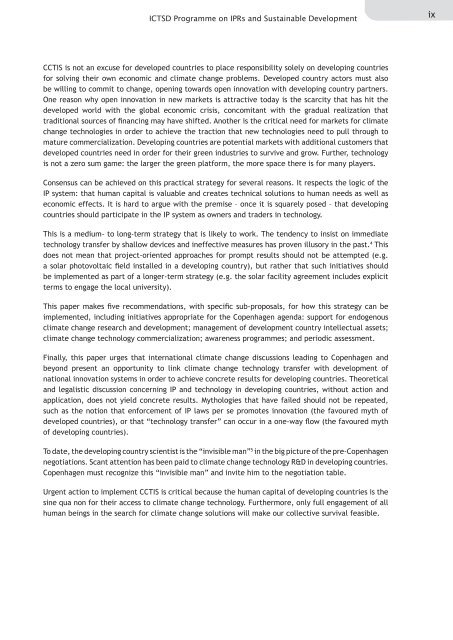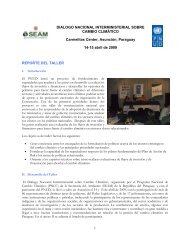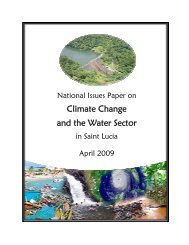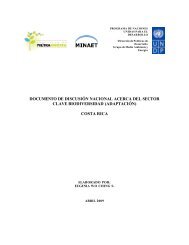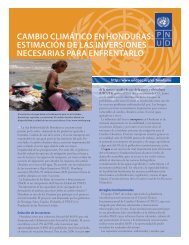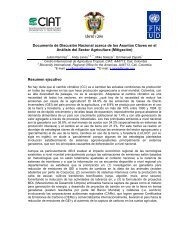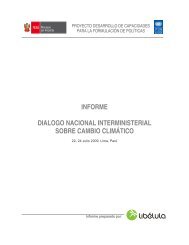View Publication - UNDPCC.org
View Publication - UNDPCC.org
View Publication - UNDPCC.org
You also want an ePaper? Increase the reach of your titles
YUMPU automatically turns print PDFs into web optimized ePapers that Google loves.
ICTSD Programme on IPRs and Sustainable Development<br />
ix<br />
CCTIS is not an excuse for developed countries to place responsibility solely on developing countries<br />
for solving their own economic and climate change problems. Developed country actors must also<br />
be willing to commit to change, opening towards open innovation with developing country partners.<br />
One reason why open innovation in new markets is attractive today is the scarcity that has hit the<br />
developed world with the global economic crisis, concomitant with the gradual realization that<br />
traditional sources of financing may have shifted. Another is the critical need for markets for climate<br />
change technologies in order to achieve the traction that new technologies need to pull through to<br />
mature commercialization. Developing countries are potential markets with additional customers that<br />
developed countries need in order for their green industries to survive and grow. Further, technology<br />
is not a zero sum game: the larger the green platform, the more space there is for many players.<br />
Consensus can be achieved on this practical strategy for several reasons. It respects the logic of the<br />
IP system: that human capital is valuable and creates technical solutions to human needs as well as<br />
economic effects. It is hard to argue with the premise – once it is squarely posed – that developing<br />
countries should participate in the IP system as owners and traders in technology.<br />
This is a medium- to long-term strategy that is likely to work. The tendency to insist on immediate<br />
technology transfer by shallow devices and ineffective measures has proven illusory in the past. 4 This<br />
does not mean that project-oriented approaches for prompt results should not be attempted (e.g.<br />
a solar photovoltaic field installed in a developing country), but rather that such initiatives should<br />
be implemented as part of a longer-term strategy (e.g. the solar facility agreement includes explicit<br />
terms to engage the local university).<br />
This paper makes five recommendations, with specific sub-proposals, for how this strategy can be<br />
implemented, including initiatives appropriate for the Copenhagen agenda: support for endogenous<br />
climate change research and development; management of development country intellectual assets;<br />
climate change technology commercialization; awareness programmes; and periodic assessment.<br />
Finally, this paper urges that international climate change discussions leading to Copenhagen and<br />
beyond present an opportunity to link climate change technology transfer with development of<br />
national innovation systems in order to achieve concrete results for developing countries. Theoretical<br />
and legalistic discussion concerning IP and technology in developing countries, without action and<br />
application, does not yield concrete results. Mythologies that have failed should not be repeated,<br />
such as the notion that enforcement of IP laws per se promotes innovation (the favoured myth of<br />
developed countries), or that “technology transfer” can occur in a one-way flow (the favoured myth<br />
of developing countries).<br />
To date, the developing country scientist is the “invisible man” 5 in the big picture of the pre-Copenhagen<br />
negotiations. Scant attention has been paid to climate change technology R&D in developing countries.<br />
Copenhagen must recognize this “invisible man” and invite him to the negotiation table.<br />
Urgent action to implement CCTIS is critical because the human capital of developing countries is the<br />
sine qua non for their access to climate change technology. Furthermore, only full engagement of all<br />
human beings in the search for climate change solutions will make our collective survival feasible.


